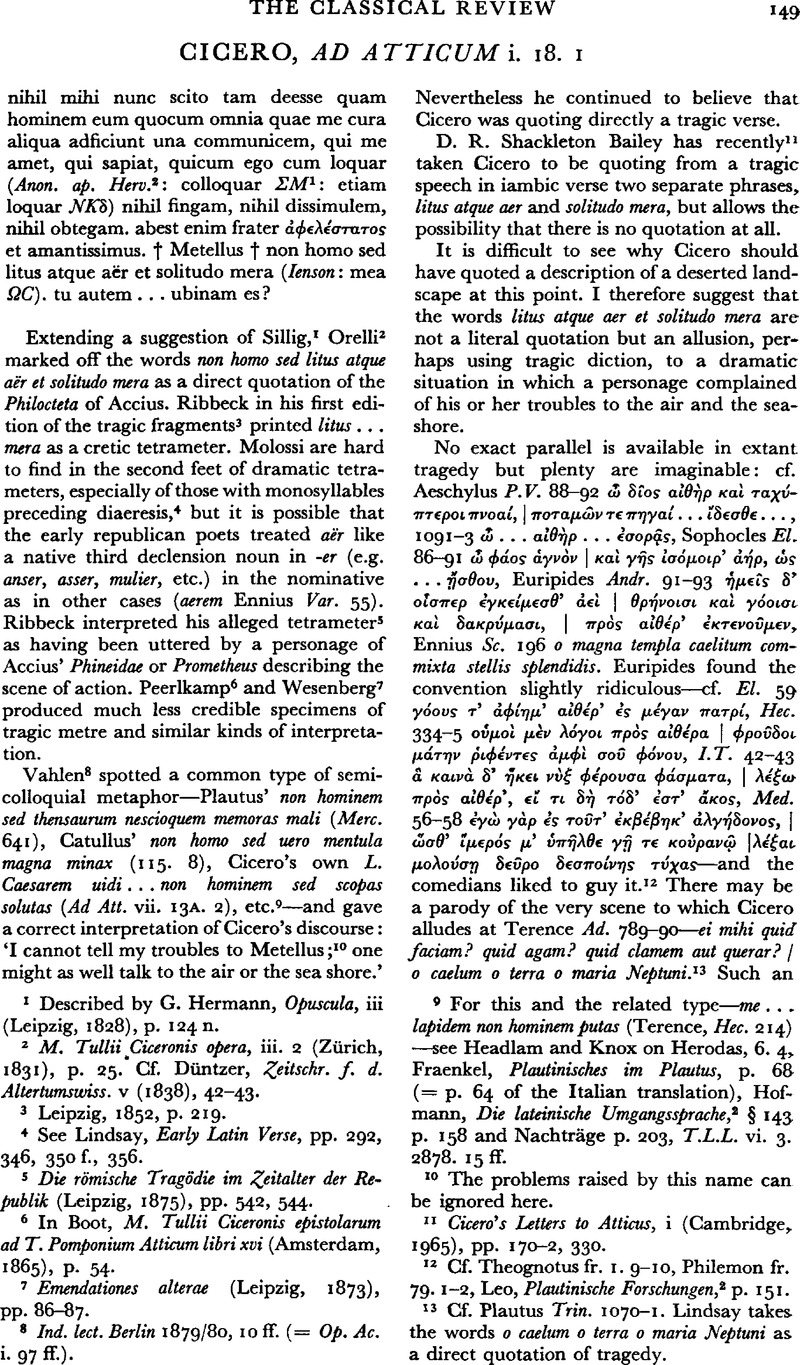No CrossRef data available.
Article contents
Cicero, Ad Atticum i. 18. 1
Published online by Cambridge University Press: 27 February 2009
Abstract

- Type
- Review Article
- Information
- Copyright
- Copyright © The Classical Association 1966
References
page 149 note 1 Described by Hermann, G., Opuscula, iii (Leipzig, 1828), p. 124 n.Google Scholar
page 149 note 2 M. Tullii Ciceronis opera, iii. 2 (Zürich, 1831), p. 25Google Scholar. Cf. Düntzer, , Zeitschr. f. d. Altertumswiss. v (1838), 42–43.Google Scholar
page 149 note 3 Leipzig, 1852, p. 219.
page 149 note 4 See Lindsay, , Early Latin Verse, pp. 292, 346, 350 f, 356.Google Scholar
page 149 note 5 Die römische Tragödie im Zeitalter der Republik (Leipzig, 1875), pp. 542, 544.Google Scholar
page 149 note 6 In Boot, M. Tullii Ciceronis epistolarum ad T. Pomponium Atticum libri xui (Amsterdam, 1865), p. 54.Google Scholar
page 149 note 7 Emendationes alterae (Leipzig, 1873), pp. 86–87.
page 149 note 8 Ind. led. Berlin 1879/80, 10 ff. (= Op. Ac. i. 97 ff.).
page 149 note 9 For this and the related type—me … lapidem non hominem putas (Terence, Hec. 214)—see Headlam and Knox on Herodas, 6. 4, Fraenkel, Plautinisches im Plautus, p. 68 (= p. 64 of the Italian translation), Hofmann, Die lateinische Umgangssprache,2§ 143 p. 158 and Nachträge p. 203, T.L.L. vi. 3. 2878. 15 ff.
page 149 note 10 The problems raised by this name can be ignored here.
page 149 note 11 Cicero's Letters to Atticus, i (Cambridge, 1965). PP. 170–172, 330.Google Scholar
page 149 note 12 Cf. Theognotus fr. 1. 9–10, Philemon fr. 79. 1–2, Leo, Plautinische Forschungen,2p. 151.
page 149 note 13 Cf. Plautus Trin. 1070–1. Lindsay takes the words o caelum o terra o maria Neptuni as a direct quotation of tragedy.
page 150 note 1 Cf. Ladewig, Analecta scenica (Strelitz, 1848), p. 15.
page 150 note 2 Cf., most recently, Strzelecki, L., Charisteria Th. Sinko ab amicis collegis discipulis oblata (Warsaw, 1951), 344 ff.Google Scholar
page 150 note 3 See Löfstedt, , Syntactica ii, p. 178.Google Scholar
page 150 note 4 Boot and Peerlkamp tried to extract trochaic verse from qui me amet qui sapiat quicum ego etiam loquar, Peerlkamp suggesting ut mecum for etiam.


